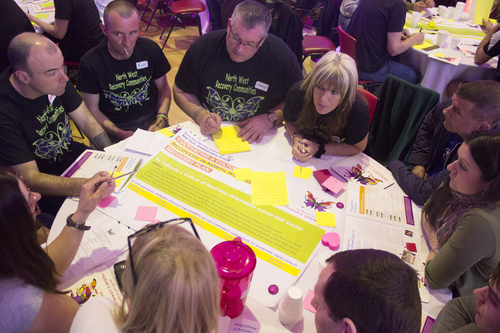
Striking a balance – exploring and illustrating asset-based approaches in services
Asset-based approaches for health improvement in Scotland have come a long way over the last five years: from inclusive, often unique practice, mostly in community-based settings, to holistic and person-centred health and care services.
Today sees the publication of Asset-based approaches in service settings: striking a balance. This new GCPH research explores how asset-based principles are being adopted and embedded in practice by different services, and how they have influenced the opportunities, life chances and wellbeing of the people who engage with them. The report brings together three years of conversations, partnership working, co-operation and research, alongside our journey of listening, learning and reflection.
There is growing consensus that asset-based approaches are a vital part of a progressive step towards improving outcomes for people and communities: they are firmly located within Scotland’s health and social care policy and ambitions for the future. Yet, despite national commitment, growing interest and examples of practice, asset-based working remains far from ‘the way we do things’.
Across Scotland, a number of national and local statutory and third sector organisations are already working in an asset-based way. Others are developing asset-based approaches as a means to improve health and wellbeing and tackle deep-rooted social problems. But what does this practice look like, what we can we learn from it, and what potential does this way of working hold for the way our services are delivered now and in the future?

Building on learning from our previous research, we set out to capture, describe and learn from services embedding asset-based principles in the way they currently work through a series of cases studies. We also wanted to uncover opinion and thinking on the potential of this way of working within public services which we explored through a series of interviews with key stakeholders.
The case studies featured in our new report are a real-world collection of people, communities, services and sectors aspiring to address complex social issues in a more holistic manner than has traditionally been taken. They demonstrate the practical experience of asset-based working across a range of settings. Collectively they show that it is possible to tip the balance of design, delivery and practice towards assets and strengths, rather than deficits, within the organisational constraints of the statutory sector.
These services are potentially addressing need in a more sustainable way, through a focus on developing strengths and mobilising individual and collective assets for positive change. For me, this quote from a member of staff powerfully embraces this vision, and reinforces the values and challenges of working in an asset-based way:
There is often the desire to just fix things… but we have to take a step back and help them [people supported by services] identify the strengths they have to address the challenges they face.
We wanted this research to go beyond describing what an asset-based way of working looks like. The research also focused on exploring the potential of asset-based approaches for service-planning and delivery by uncovering the views and opinions of senior strategic and operational managers. A step towards asset-based working was broadly supported, although mixed views were evident.
Across the research we learned about the importance of evidence to legitimise and provide reassurance about (new) ways of working, and the significance of personal values, attributes and making time. The language of asset-based approaches remains a contentious issue, but beyond the name there is a move towards a mutual and shared understanding of the underpinning values.
We also found that the workforce was striving to collaborate with a clear vision for positive change, often going beyond the traditional requirements of their roles. Working across services and building relationships with wider staff teams requires patience, personality (and often perseverance).
At their heart, asset-based approaches are about promoting and strengthening the factors which support good health and wellbeing, protecting against poor health, and helping to build communities and networks that sustain and promote wellbeing. They reflect a commitment to operate in a different way. Rather than organising services around problems and illnesses, asset-based approaches value a sense of wellbeing which can help build recovery, resilience and health through the quality of relationships between people, services and local communities.
We hope this research brings to life the experiences and practice of the many people who contributed to this study, who gave so freely of their time and opened their services to us. We continue to be inspired by people working with sensitivity, compassion and the importance of building relationships at the centre of all they do.
Access the report: Asset-based approaches in service settings: striking a balance
Access: Briefing paper 51: Asset-based approaches in service settings
These two infographics provide an overview of the thoughts and experiences of people involved in the research. Click to enlarge or you can download the infographics as PDFs.
Asset-based approaches in service settings - what's important?
Asset-based approaches in service settings - what's the potential?